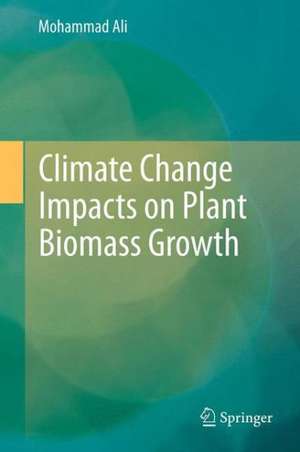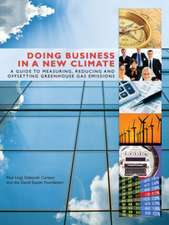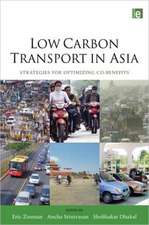Climate Change Impacts on Plant Biomass Growth
Autor Mohammad Alien Limba Engleză Paperback – 15 oct 2014
| Toate formatele și edițiile | Preț | Express |
|---|---|---|
| Paperback (1) | 632.05 lei 43-57 zile | |
| SPRINGER NETHERLANDS – 15 oct 2014 | 632.05 lei 43-57 zile | |
| Hardback (1) | 638.43 lei 43-57 zile | |
| SPRINGER NETHERLANDS – 3 sep 2012 | 638.43 lei 43-57 zile |
Preț: 632.05 lei
Preț vechi: 743.59 lei
-15% Nou
Puncte Express: 948
Preț estimativ în valută:
120.94€ • 126.61$ • 100.07£
120.94€ • 126.61$ • 100.07£
Carte tipărită la comandă
Livrare economică 07-21 aprilie
Preluare comenzi: 021 569.72.76
Specificații
ISBN-13: 9789401782678
ISBN-10: 9401782679
Pagini: 124
Ilustrații: X, 114 p.
Dimensiuni: 155 x 235 x 7 mm
Greutate: 0.19 kg
Ediția:2013
Editura: SPRINGER NETHERLANDS
Colecția Springer
Locul publicării:Dordrecht, Netherlands
ISBN-10: 9401782679
Pagini: 124
Ilustrații: X, 114 p.
Dimensiuni: 155 x 235 x 7 mm
Greutate: 0.19 kg
Ediția:2013
Editura: SPRINGER NETHERLANDS
Colecția Springer
Locul publicării:Dordrecht, Netherlands
Public țintă
Lower undergraduateCuprins
Contents.- I. Introduction.- 2. Climate Change: What is in the Name.- 3. The Greenhouse Effect.- 4. Effects of Climate Change on Vegetation.- 5: Role of Vegetation in Reducing CO2.- 6: The Carbon Balance in the Managed Forest.- 7. Short and Long Term Resolution.- 8. Environmental Regulations on Activities Associated with Enhanced Co2 Concentrations.- 9. Perspective of Climate Change in Bangladesh.- 10. Conclusions.
Textul de pe ultima copertă
Plant biomass plays a crucial role in environment and life. Except for its absorption of solar energy, the earth is a closed system; green biomass is the only part that captures, converts and allocates solar energy to other components and consumers of the ecosystem. Humans occupy almost all positions in the consumer chain, deriving food, fiber, fuel and fodder directly from green biomass and indirectly through other primary and secondary consumers of green plants. Hence, the performance of green biomass is important for smooth functioning of all components of the earth system and for the manner of human existence.
This book defines climate change and describes the greenhouse effect, and goes on to discuss how increased levels of CO2 affect plant life. The author shows how vegetation can play a role in capturing carbon, discussing forest management in short- and long-term resolution of elevated CO2 levels. The description is enhanced by a chapter offering Professor Ali’s perspective on problems related to climate change in Bangladesh.
Environmental changes are cumulative, multifarious, irreversible and borderless; and are likely to cause changes in site, climatic factors, nature and impact of diseases. The effects are more uncertain because different plants will react differently, and because soil conditions will change little over the same time span. Differential growth could change the competitive relationships of species, with resulting effects on community structure and abundance.
The changes could be so abrupt and extremity laden that modern civilization cannot be sustained without international co-operation. No single nation has either the political mandate or economic power to combat climate change alone; the effort to combat change must be made global. Small and poor countries like Bangladesh, though having little influence on global climate change, would be mostharmed; therefore, they should seek co-operation from the international community in joining in the campaign.
This book offers a methodical explanation of our biomass-driven ecosystem, the undeniable uncertainties posed by the response of vegetation to changes in environmental conditions and the fact that humans everywhere have an interest, even an obligation, to cooperate in a global campaign to combat climate change.
This book defines climate change and describes the greenhouse effect, and goes on to discuss how increased levels of CO2 affect plant life. The author shows how vegetation can play a role in capturing carbon, discussing forest management in short- and long-term resolution of elevated CO2 levels. The description is enhanced by a chapter offering Professor Ali’s perspective on problems related to climate change in Bangladesh.
Environmental changes are cumulative, multifarious, irreversible and borderless; and are likely to cause changes in site, climatic factors, nature and impact of diseases. The effects are more uncertain because different plants will react differently, and because soil conditions will change little over the same time span. Differential growth could change the competitive relationships of species, with resulting effects on community structure and abundance.
The changes could be so abrupt and extremity laden that modern civilization cannot be sustained without international co-operation. No single nation has either the political mandate or economic power to combat climate change alone; the effort to combat change must be made global. Small and poor countries like Bangladesh, though having little influence on global climate change, would be mostharmed; therefore, they should seek co-operation from the international community in joining in the campaign.
This book offers a methodical explanation of our biomass-driven ecosystem, the undeniable uncertainties posed by the response of vegetation to changes in environmental conditions and the fact that humans everywhere have an interest, even an obligation, to cooperate in a global campaign to combat climate change.
Caracteristici
Defines, describes and explains the complex of processes that contribute to climate change Shows how the plant biomass can be managed to sequester carbon and reduce environmental CO2 levels Includes a case study close-up of climate change in Bangladesh Argues that the global response to climate change must include cooperation and effort by nations large and small









